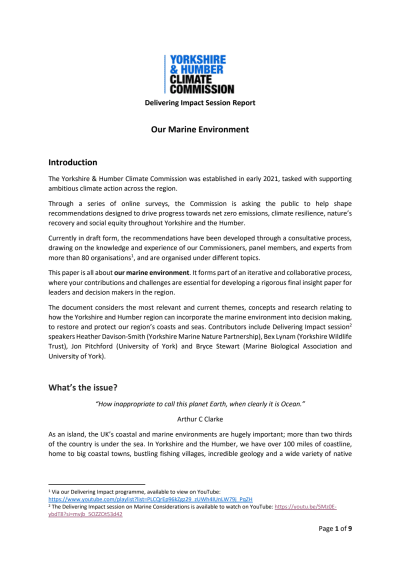Home
Our marine environment
Protecting the region's coastal and marine environments
Have your say on how we can protect and restore the life and habitats of our coastlines and seas.
Introduction
Yorkshire and the Humber is home to over 100 miles of coastline, characterised by incredible scenery, bustling fishing villages and historically a diverse web of marine wildlife. Our oceans provide us with so much - a place of refuge, work, or recreation, as well as a means to generate renewable energy and produce food. The global ocean has even acted as a buffer to climate change, drawing down excess carbon emissions and absorbing excess heat.
But our seas are suffering as a result of human activity, jeopardising these diverse habitats and the benefits we currently enjoy. We may not all live near the sea, but our actions on land all impact the environments off our shores.
Below you will find a draft paper on this topic, which sets out actions we can take in the region to protect and restore our coastlines and seas. The paper draws on the knowledge and experience of our Commissioners, as well as existing research and insights from our Delivering Impact session.
Please read the draft paper on our marine environment, and share your thoughts in the survey below.

The draft paper brings in ideas and expertise from our Commissioners, research, and experts who are tackling the problem across the country, in the region, and on the ground. You can watch the expert speaker session on this topic in the video at the foot of this page.
At this stage, the paper might not give the full picture so we would really value your feedback. The ideas we are discussing affect everyone - we want to know what you think.
So please give your responses in the survey below.
The paper outlines a number of ways we can protect our coastline and seas in the region, including:
- Explore the potential for a regional strategic land and water management framework.
- Include marine in local nature recovery strategies.
- Increase the number of marine protected areas.
- Allow multi-stakeholder input into projects that have implications beyond our coastlines.
- Include blue carbon in the greenhouse gas inventory.
- Advocate for the marine environment in planning policy and decision making.
- Produce a regional carbon map that includes marine.
We would like your input to challenge and shape the ideas set out in this first draft.
We are keen to hear from experts on different aspects of marine and coastal environments, to ensure rigour in our interpretation of the science and social factors underpinning this paper.
We are equally keen to hear the views of people who live and work in Yorkshire and the Humber to ensure our final position paper and actions address the needs of people and communities across the region.
Not important
Very important
Not at all confident
Very confident
Not enough
Enough
Not at all possible
Definitely possible
Not at all confident
Very confident

Drop files to upload
A recording of the Delivering Impact session on marine considerations is available to view below.
If you do not wish to view the video, click 'next' to submit your survey.
We heard from four expert speakers during this session on 8 September 2023, each presenting their perspectives on the marine environment. The speakers, panel and other attendees then discussed the opportunities and the actions we could take as a region.
Heather Davidson-Smith, Yorkshire Marine Nature Partnership
Bex Lynam, Yorkshire Wildlife Trust
Jon Pitchford, University of York
Bryce Stewart, Marine Biological Association and University of York
